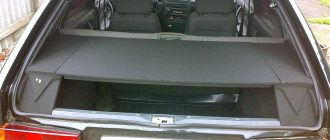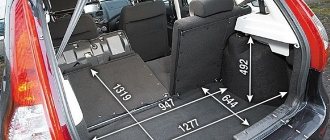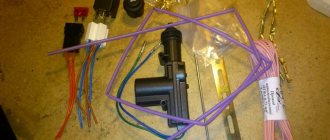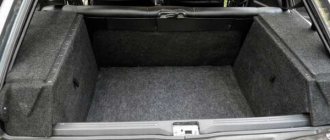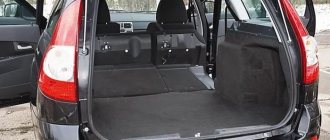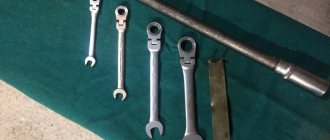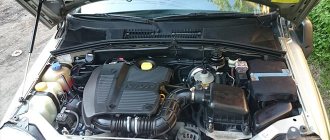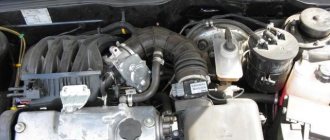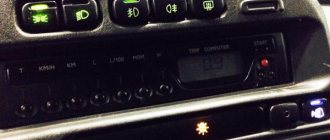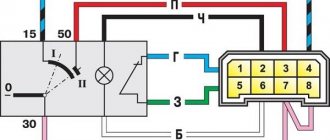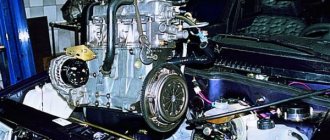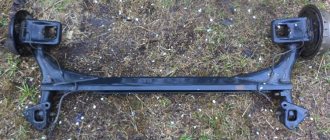The trunk width of the VAZ 2114 for all modifications ranges from 427 (l) to 300 to 632 (l).
Rack parameters for standard modifications:
1.6 l., Petrol, Mechanical, 5 speed, Front:
- Trunk volume: from 300 to 632 (l);
1.5 l., Petrol, Mechanics, 5 speed, Front:
Checkpoints:
The dimensions of the trunks are taken using control points, which have an individual location for various modifications of the car; in most cases, their location on the drawings is as follows:
- A: top left corner;
- B: top right corner;
- E: inseam to the far left (bottom corner);
- D: Inseam to the far right (bottom corner).
Important: if, due to the structural features of the car body, the trunk does not have standard control points, then the data is provided in the length/width/height format.
Other names:
Other designations for the VAZ 2114 hatchback on the Russian market: VAZ 2108, VAZ 2109, VAZ 2113, Lada Samara.
years of production of all modifications of the model: 2001-2013.
| General parameters of VAZ 2114 luggage racks | |||
| Drawing General view of luggage racks | Width min (mm) Minimum trunk width for different modifications of VAZ 2114. | ||
The measurement is taken on the outside.
Data is presented in millimeters (mm)
The measurement is taken on the outside.
Data is presented in millimeters (mm)
| Width max (mm) Maximum trunk width for different modifications of VAZ 2114. | Modifications Number of modifications of the model in our database | ||
| (drawing) | 427 (l) | from 300 to 632 (l) | 2 |
| Parameters of luggage racks VAZ 2114 | |
| Parameter Parameter of racks | |
The data is presented for cars of various modifications and years of manufacture
Caution: the above data are the official figures of the manufacturer, however, please note that the information is for reference only and does not guarantee absolute accuracy.
VAZ-2114 is a car that replaced the discontinued “Nine”, and immediately gained popularity and became in demand. Compared to its predecessor, this car model has several differences. The differences affected not only the external parts of the body, but also the interior. In particular, the VAZ-2114 has a large trunk volume. Door sill trims, moldings along the sides, a spoiler with a brake light - all this gives the car a modern appearance.
External changes affected the performance characteristics of the machine. In particular, this model has excellent aerodynamic qualities. It is stable on the road, even when driving at high speed. The combination of body colors and attached parts gives this car the appearance of a foreign car.
Thanks to its appearance, this car has aroused increased interest among people who are involved in tuning. At relatively low financial costs, such a car can easily be made into an original car that stands out from the crowd, thereby emphasizing the individuality and sense of style of its owner.
Trunk
Due to the ability to fold the rear seat, this car can easily be transformed into a utility vehicle. For this car model, the trunk volume is:
- 330 dm 3 with seats folded down;
- 600 dm 3 with rear seats folded.
The volume in liters is the same as in cubes (cubic decimeters).
This capacity of the machine allows it to transport even large cargo, which is especially important for those who often face the need to deliver any goods or cargo for other purposes to the unloading point. With the seats folded down, the trunk volume almost doubles.
In addition, if you need to transport a large amount of cargo, or, for example, you are going on a trip with the whole family, you do not have to be limited to 330 liters of space for storing things. Various fastenings and installations are available for sale for this car model, which allow you to transport much more things than will fit in the luggage compartment.
For example, you can install a roof rack. Various options for such mounts are available for sale:
- Autoboxes.
- Fastenings for sports equipment.
- Baskets.
- Expeditionary roof racks.
Thus, you will be able to make your car even more spacious and free up space for passengers.
Modernization
Whatever one may say, after several years of operation, even the most elegant car wants to be modernized. Automakers have long understood this, periodically introducing restylings and tuners making changes on their own.
Regarding the 15th model, many attempts at modernization were carried out at the amateur level. Some images of such tuned cars have every right to be called masterpieces, others, to put it mildly, are not impressive.
When the car's mileage reaches 50 thousand km, it's time to think about the suspension. Tuners recommend upgrading it first, as one of the weakest areas.
Over time, the reaction is no longer the same as before, when even on the icy road 2115 confidently passed through flat sections and turns. Now the rear of the car begins to toss from side to side, and the acceleration dynamics and handling are no longer the same.
The second, no less important note relates to the comfort of the car. Over time, the already frail sound insulation completely wears out. Everything starts to creak, including the rear parcel shelf.
Modernization also concerns the introduction of various options. To be honest, almost all VAZ car models reach the end user as “semi-finished products”. There is no competent anti-corrosion treatment of the body, there are no required comfort and safety parameters.
Here are the activities that are usually carried out, such as tuning and modernization on the 15th model:
- Installation of lockers and protection of the power unit crankcase;
- Replacement of sedan door and trunk locks with new, silent ones;
- Replacement of covers;
- Modernization of disks by installing new cast ones;
- Noise insulation and anti-creak treatment of various parts of the body, necessarily the roof and doors;
- Body painting and anti-corrosion treatment of the floor and other components most susceptible to corrosion;
- Installation of body reinforcement (struts);
- Replacing bumpers;
- Replacement of wing and spoilers;
- Remodeling doors and much more.
Painting
Painting has a longer history than the car itself. At least if you mean a paint gun. Modern tools are made at the highest level and make it easy and quick to paint a part or the entire body in the appropriate color.
Note that small scratches on the paintwork of the 15th model can be easier to remove by polishing. But if they are too deep and reach the ground or metal, you have to paint them.
As you know, painting can be carried out in 2 ways: partially, when the parts are painted with a transition, or completely.
Transition painting is applicable only in cases where one or another body section is being restored. This method has both advantages and disadvantages.
Note. In particular, with this method, body parts will not need to be dismantled, and therefore the structure will not be damaged. On the other hand, partial painting cannot guarantee the long-lasting effect of paintwork as much as complete painting.
It was written above about the pistol, but you can paint the 15th model in your garage using a spray can. But this method has many disadvantages:
- The spray can has an uneven spray, which significantly complicates painting (an overly saturated jet causes smudges);
- It is difficult to choose the appropriate color of paint sold in cans;
- Spray paint fades faster over time (such paint protects the surface less well).
Advice. If, however, you chose the spray can painting method, it is recommended to apply thin layers, keeping the spray can as far as possible from the body part.
Example of painting a rusty part
Let's say that this is the wing of the 15th VAZ model:
- Wash the car completely;
- Get rid of rust by sanding the part with coarse sandpaper and applying a degreaser;
- Restore the geometric dimensions of the part by applying layers of putty.
Attention. If the body part is subject to frequent vibrations, then ordinary putty will not work. You need to choose one with aluminum particles.
Regarding the application of putty:
- It must first be properly diluted with the hardener, doing this in small portions (the mixture dries quickly);
- You need to apply it directly to the surface, remembering that the putty dries for about a quarter of an hour if the room temperature is at least 20 degrees.
Button control
It is very convenient when control (opening the trunk) is carried out from a button. Every car owner knows that it is very important to ensure that the trunk, like the car doors, closes securely. Reliable operation of trunk locks is just as important as the reliability of the lock on a garage or apartment door. All modern car models are equipped with a trunk opening mechanism using a control panel or a special button. Installing a mechanism with a button not only makes control more convenient, but also solves a number of problems. In particular, this solves the problem of icing of the lock, which is opened with a key.
The installation of such a mechanism can be entrusted to a specialist. But some car owners prefer to do this work themselves. To do this, you will need a steel cable, a roller, a connection button, a trunk drive solenoid and wires. The roller is installed on the wiper gear housing. If the roller is open, you can use braided cable. The easiest way to connect is to the cigarette lighter. Other options require appropriate knowledge of electrical circuits.
VAZ cars, 2113, 2114 and 2115 are models that are popular among domestic drivers. This is due to their low cost, maintainability, relative reliability and unpretentiousness. And the practicality of using the car depends on the volume of the trunk of the VAZ 2114.
Ilya Pimenov
— Questions about the legality of such tuning and the likelihood of passing inspection on this car are quite predictable. However, all modifications were made by an authorized technical center, and the craftsmen installed certified spare parts. This car has a special sports technical passport, and the pilot has a sports category according to the requirements of the RAF. As for the rest: the exterior and interior of the car are standard, the steering wheel and brakes work perfectly, the headlights shine as expected, exhaust gases are within normal limits... There is a first aid kit, a fire extinguisher and a warning triangle. Everything is absolutely legal. The maintenance ticket was not purchased.
VAZ-211340: Club-standard
VAZ 2113
Thanks to the trunk volume of the VAZ 2113, drivers have the opportunity to transport large cargo. Its capacity is 330 liters. The technical characteristics of the luggage compartment make it possible to transport items of non-standard sizes.
The trunk of the 2113 model is transformable: the driver can remove the shelf and fold down the rear seats. After this, its capacity is 632 liters. The hatchback allows you to transport small and long cargo.
Disadvantages include the lack of standard lighting (when tuning a car, you install it yourself), a high loading side, which makes it difficult to place cargo inside.
VAZ 2114
VAZ 2114 is a reliable five-door car. The capacity is 330 liters with the seats folded down, and with the seats folded down it is equal to 632 liters. The loading height of the side has an inconvenient level (similar to that used on the thirteenth model), which significantly complicates the loading process.
The dimensions of the trunk are as follows: length - 830 millimeters with the seats folded and almost 1660 millimeters with them unfolded, width - 935 millimeters, depth - 830 millimeters, height - 780 millimeters. These dimensions are approximate and are valid for models 2113 and 2114.
Transformation capabilities allow you to load items whose length and dimensions differ from standard dimensions. When installing additional luggage structures on the roof, you can transport a certain amount of large cargo.
The capacity, expressed in liters, is identical to the volume, which is indicated in cubic decimeters.
Removing and replacing side lamps in the rear light
The replacement process involves sequentially performing the following steps:
- the trunk opens;
- to gain access to the headlight, remove the carpet covering it from the inside;
- the board contacts are disconnected;
- the bar is removed (all the rear light bulbs are on it).
Replaced with a new side light bulb (the side light bulbs on the VAZ 2114 have the smallest size, so it will be difficult to confuse them); The board with the new light bulb is installed in its original place.
If replacing the light bulb in the front/rear marker does not produce results and the side lights still do not work, then you need to check the appropriate fuses or look for other causes of the malfunction.
VAZ 2115
The trunk volume of the VAZ 2115 is 427 liters with the seats folded down; if they are unfolded, the capacity increases to 700 liters. The dimensions of the luggage compartment have been increased, thanks to which even large-sized cargo can be transported on the fifteenth model.
The advantages include ease of dismantling, installation of a shelf, as well as a convenient height for loading. It is located almost at the level of a car bumper.
Drivers often improve sound insulation and standard luggage compartment lining. They install an electric drive for opening the lid, install lighting, and construct boxes for storing small items (however, due to their installation, the trunk significantly loses volume).
Instructions for installing a new heater
New sample
The “new” radiator has the following fastenings: a nut near the filter, a screw on the lower end of the windshield and two nuts located above the intake manifold.
If your car has a heated glass system, you need to remove the expansion tank. The stove filter also needs to be removed and replaced if necessary. We remove it by unscrewing 4 screws, and then take out the filter. Now replacing the VAZ 2110 heater radiator: The arrows point to the fasteners that need to be removed to access the radiator.
- The new model heater is not one piece - it is assembled from two halves. They are connected using three self-tapping screws. Two screws can be found on the front side of the heater radiator, and the third is under the hose that goes to the heater fan. Finding the hose is not difficult - it is L-shaped.
The location of the radiator is under the hood of the car.
The fasteners have been removed, let's move on. Problems may arise when dismantling the heater, so you need to stop here. To remove the left part, we need to firmly grasp it with our left hand, and with our right hand, respectively, the right half. Now press on the heater and lift both parts up. The right side is easier to remove - you just need to pull it to the right with force.
The right side of the stove radiator. It needs to be disassembled into 2 more parts.
We dismantle both parts, then remove the steam exhaust hose through the hole in the soundproofing panel. If the left half of the heater is solid, then the right half is again divided into two parts. Metal brackets are installed as fastenings. We need to dismantle them along with the seal. After this, the right side will decompose on its own. Now a passage to the damper has opened. It’s better to replace it too; the ideal option is glued aluminum.
Disassembled right side of the radiator. The parts are fastened to each other using steel brackets.
After this, you can install a new part using the same principle.
For reference: there should be about 4 liters of liquid. Inspect the antifreeze: if it is relatively clear, then it can be refilled into the new heater radiator.
Old sample
- We follow all the steps to drain the coolant. Now you need to remove the seal installed in the windshield - if desired, you can also change it. Then you should remove the lining itself, which is called the “jabot”. It is secured with a screw located under the master cylinder. We unscrew it.
The arrows point to the frill. We need to take it down.
The main screw that holds the frill. It should be unscrewed.
Next, you need to unscrew the 4 fastenings of the upper clamps. The hoses and wires are held in place by two clamps - remove them.
4 fasteners that need to be removed.
Now you should disconnect the negative terminal of the battery - a standard procedure for repair and maintenance. Let's move on to the left side of the frill, it is held in place by 2 screws. We unscrew them and pull the frill towards us. Important: the frill should not come out completely.
Pull out the negative terminal of the battery. This must be done to ensure safety.
The next step is to remove the windshield trim. Behind it there is an antifreeze level sensor - disconnect the plug from it and take out the hot air hose. It comes from the expansion tank.
Washer hose, sometimes difficult to find under the hood.
Now you need to remove the washer hose, which is attached to the windshield with four screws. We remove the heater housing clamps, windshield wipers and trim.
Arrows indicate fasteners that need to be removed.
We have a filter in front of us. He's also filming. As a result, you need to dismantle the steam supply and exhaust hoses, the filter housing, the antifreeze return and the rear part of the fan (not all VAZ 2110 cars have it).
Air filter mounts. After dismantling the filter, you can begin installing a new radiator.
Done, all that remains is to change the heater radiator. The work is performed in reverse order.
Trunk Features
The features of the luggage compartments of various modifications of models 2113, 2114, 2115 include an acceptable level of capacity and the possibility of transforming the interior to increase useful volume.
The VAZ 2115 is distinguished by a convenient loading height and a larger trunk volume than the Lada 2115. Otherwise, the design of the cargo compartment is identical to other models.
Cars are equipped with a standard shelf; it is installed vertically and separates the luggage compartment and the interior. If necessary (for example, when transporting large cargo that requires folding the rear seats), this shelf and the vertical curtain can be removed.
On Lada 2113, 2114, 2115 cars, under the “floor” of the trunk there is a niche for storing a spare wheel and tools necessary for quickly repairing small faults that may arise along the way.
The VAZ 2115 is distinguished by a convenient loading height and a larger trunk volume than the Lada 2115. Otherwise, its design is identical to other models.
The VAZ 2113, 2114, 2115 models, which are modifications of the “eights”, “nines” and “ninety-nines”, respectively, have become more ergonomic, easy to use, and practical. The cars received spacious luggage compartments, which increased the amount of cargo transported. The presence of a number of shortcomings does not deter drivers: some inconveniences can be corrected on their own.
Cars of the VAZ 2113, 2114, 2115 family are popular not only in Russia, but also in the CIS countries. This is due to the wide distribution of these cars, their unpretentiousness, relative reliability, maintainability and cost. The machines have an acceptable loading niche capacity, which makes them convenient to use for solving everyday household problems or running a small business.
Changes
Electrical diagram of VAZ 2113 / 2114 / 2115
Overall, despite some similarities, the 2115 has a significantly more modern design. This was largely due to the presence of bumpers and other external elements made of plastic. All of them help protect the body from minor damage and the negative effects of corrosion.
The most notable innovations in this model are the following:
- additional brake signal installed directly on the spoiler;
- new rear lights;
- highly reliable security system;
- a tailgate sill that allowed the loading height to be reduced;
- more streamlined body geometry;
- door moldings;
- modern electrical equipment.
At the time the design was completed, the VAZ-2115 was a modern and quite beautiful car. At the same time, its interior turned out to be much more comfortable than that of the old models of the Volzhsky Automobile Plant. The driver was able to regulate:
- steering wheel height;
- seat position, etc.
The designers installed a console between the front seats. The heating system and the ECU also turned out to be more advanced. Moreover, the trunk of the model in question is much more spacious than its predecessors.
VAZ 2114 dimensions and weight
Body dimensions are one of the most important parameters when choosing a car. The larger the car, the more difficult it is to drive in a modern city, but also the safer. The overall dimensions of the Lada 2114 Samara are determined by three dimensions: body length, body width and body height. Typically, the length is measured from the most forward point of the front bumper to the farthest point of the rear bumper. The width of the body is measured at the widest point: as a rule, these are either the wheel arches or the central pillars of the body. But with height, not everything is so simple: it is measured from the ground to the roof of the car; The height of the roof rails is not included in the overall height of the body.
Overall dimensions of the Lada 2114 Samara are 4122 x 1650 x 1402 mm, and the weight is from 985 to 1060 kg.
Dimensions Lada 2114 Samara 2001, hatchback 5 doors, 1st generation
| Value (mm) Parameter value in (mm) | ||||||
| 1.6 l., Petrol, Mechanical, 5 speed, Front | ||||||
| Trunk volume | from 300 to 632 (l) | |||||
| 1.5 l., Petrol, Mechanical, 5 speed, Front | ||||||
| Trunk volume | 427 (l) | |||||
| Options | Dimensions | Weight, kg |
| 1.5 MT Basic | 4122 x 1650 x 1402 | 985 |
| 1.6MT0 | 4122 x 1650 x 1402 | 985 |
| 1.6 MT Basic | 4122 x 1650 x 1402 | 985 |
| 1.6MT0 | 4122 x 1650 x 1402 | 985 |
| 1.6MT0 | 4122 x 1650 x 1402 | 985 |
| 1.6MT2 | 4122 x 1650 x 1402 | 985 |
| 1.6MT0 | 4122 x 1650 x 1402 | 985 |
| 1.6 MT 211440-24 | 4122 x 1650 x 1402 | 985 |
| 1.6 MT 211440-26 | 4122 x 1650 x 1402 | 985 |
| 1.6MT0 | 4122 x 1650 x 1402 | 1060 |
| 1.6MT2 | 4122 x 1650 x 1402 | 1060 |
| 1.6MT0 | 4122 x 1650 x 1402 | 1060 |
| 1.6MT1 | 4122 x 1650 x 1402 | 1060 |
Carrying out repair work
1 – front bumper; 2 – radiator frame; 3 – front right wing; 4 – radiator frame panel; 5 – radiator frame support; 6 – upper cross member of the radiator frame; 7 – right front fender mudguard; 8 – right front spar; 9 – hood hinge; 10 – front panel; 11 – hood; 12 – front suspension spring support; 13 – air supply box; 14 – windshield frame; 15 – front door; 16 – roof beams; 17 – roof panel; 18 – trunk lid; 19 – rear window frame; 20 – left outer side panel; 21 – rear floor; 22 – rear bumper; 23 – rear door; 24 – spoiler; 25 – front seat bracket; 26 – front floor; 27 – front floor cross member; 28 – floor reinforcement; 29 – front left wing; 30 – left front fender mudguard; 31 – towing eye bracket
The repair stages are as follows.
- Surface preparation. Using a solvent, a special liquid is applied to the plastic element and external contaminants, asphalt particles and resin are removed.
- Sand the damaged plastic fragment, smoothing out paint chips and removing traces of corrosion.
- Select paint color.
- Putty and prime, giving the elements smoothness.
- Painting parts. The prepared plastic elements are painted, keeping the color shade in accordance with the rest of the car.
After an accident, when parts are seriously damaged - the hood, fenders, sills, trunk, there is no need to purchase a new body, it can be restored. In this case, specialists will repair it. The craftsmen check whether the type and geometry of the body elements correspond to the original linear dimensions established by the manufacturer.
To do this, restore the dimensions of the openings of the hood, doors and other necessary elements for further repair and painting of damaged parts:
- cut and remove damaged body parts;
- check whether the geometry of the entire body corresponds to factory specifications;
- in case of discrepancies in sizes, all components are adjusted and adjusted;
- grind and prime the prepared elements;
- carry out color selection for painting the part;
- The type of paint coating is determined, since there may be incompatibility between the old coating and the new paint. The type of paint is determined based on the information available to the manufacturer. When choosing a painting technology, its sensitivity to solvents is taken into account;
- Subsequently, painting is carried out in special chambers and varnish is applied.
If the craftsmen have completely completed the repair, then you don’t have to look for a new body, but install all unpainted elements on the repaired one. In this case, the owner can decide on a new color choice for his car, since painting of many parts will be necessary.
How many seats in VAZ 2114
The Lada 2114 Samara car has 5 seats.
How many seats in Lada 2114 Samara 2001, hatchback 5 doors, 1st generation
| Options | Number of seats |
| 1.5 MT Basic | 5 |
| 1.6MT0 | 5 |
| 1.6 MT Basic | 5 |
| 1.6MT0 | 5 |
| 1.6MT0 | 5 |
| 1.6MT2 | 5 |
| 1.6MT0 | 5 |
| 1.6MT0 | 5 |
| 1.6MT2 | 5 |
| 1.6MT0 | 5 |
| 1.6MT1 | 5 |
| 1.6 MT 211440-24 | 5 |
| 1.6 MT 211440-26 | 5 |
Reviews about the car
After analyzing reviews from car owners, we can draw the following conclusions. Externally, the car looks old-fashioned when compared with new models from the Lada campaign. There is very little space in the back seat of the car; tall people will clearly feel uncomfortable. Even an inexperienced owner can figure out the engine compartment; everything is in its place.
The chassis of the machine will last a long time if used carefully. Spare parts for the car are affordable. The suspension is very stiff, even if installed from Priora. There is practically no sound insulation in the car, extraneous sounds are constantly heard, so many owners purchase additional soundproofing sheets and tape the car body. The gaps in the car body are simply disgusting; you could stick your index finger into some parts.
The lack of air conditioning has a deplorable effect, especially in the summer season. In general, the car looks much better compared to the VAZ-2109. The seat adjustment is not the best; it is very difficult for a beginner to adjust the seats to suit their configuration. For such a low cost, you can close your eyes to all the shortcomings of Russian production, especially when it comes to Lada cars. The VAZ 2114 has become a popular car especially among the younger generation.
Trunk volume of VAZ 2114
The spacious trunk will come in handy around the house. Many car enthusiasts, when deciding to buy a car, consider trunk capacity as one of the first things they look at. 300-500 liters - these are the most common volume values for modern cars. If you can fold the rear seats, the trunk will increase even more.
The trunk on the Lada 2114 Samara is 427 liters, depending on the configuration.
Trunk volume Lada 2114 Samara 2001, hatchback 5 doors, 1st generation
| Options | Trunk capacity, l |
| 1.5 MT Basic | 427 |
| 1.6MT0 | 427 |
| 1.6 MT Basic | 427 |
| 1.6MT0 | 427 |
| 1.6MT0 | 427 |
| 1.6MT2 | 427 |
| 1.6MT0 | 427 |
| 1.6MT0 | 427 |
| 1.6MT2 | 427 |
| 1.6MT0 | 427 |
| 1.6MT1 | 427 |
| 1.6 MT 211440-24 | 427 |
| 1.6 MT 211440-26 | 427 |
What drive does the VAZ 2114 have?
There are only three types of drive. Front-wheel drive (FF) - when torque from the engine is transmitted only to the front wheels. All-wheel drive (4WD) - when the torque is distributed to the wheels of both the front and rear axles. And also Rear-wheel drive (FR), in its case, all the engine power is completely given to the two rear wheels.
Front-wheel drive is “safer”, front-wheel drive cars are easier to control and more predictable in motion, even a beginner can handle them. Therefore, most modern cars are equipped with front-wheel drive. In addition, it is inexpensive and requires less attention to maintain.
All-wheel drive can be called an advantage of any car. 4WD increases the vehicle's cross-country ability and allows its owner to feel confident both in winter on snow and ice, and in summer on sand and mud. However, you will have to pay for the pleasure, both in increased fuel consumption and in the price of the car itself - cars with a 4WD drive type are more expensive than other options.
As for rear-wheel drive, in the modern automotive industry it is equipped with either sports cars or budget SUVs.
Drive Lada 2114 Samara 2001, hatchback 5 doors, 1st generation
| Options | type of drive |
| 1.5 MT Basic | Front (FF) |
| 1.6MT0 | Front (FF) |
| 1.6 MT Basic | Front (FF) |
| 1.6MT0 | Front (FF) |
| 1.6MT0 | Front (FF) |
| 1.6MT2 | Front (FF) |
| 1.6MT0 | Front (FF) |
| 1.6MT0 | Front (FF) |
| 1.6MT2 | Front (FF) |
| 1.6MT0 | Front (FF) |
| 1.6MT1 | Front (FF) |
| 1.6 MT 211440-24 | Front (FF) |
| 1.6 MT 211440-26 | Front (FF) |
Lowriders movement
The Low Rider movement originated 60 years ago in the USA. In Russia, it has only now become relevant for car enthusiasts, and is especially popular among young people. “Low Riding” is a lowering of the car’s suspension; the lower the car “lies”, the better.
"Lada 2114" was no exception in this style. After shortening the suspension spring, the car becomes more stable. The appearance of the car is not for everyone; many criticize the style of lowered cars.
Also newfangled was the installation of air suspension on the fourteenth family. The advantage of this suspension is that the ground clearance can be adjusted. The cost of air suspension reaches 100,000 rubles.
As a rule, only original and branded wheels are installed on the car, or even left on standard wheels. Thousands of drivers spend a lot of money on modifying the “fourteenth”. In the photo, the Lada 2114 is presented in a lowered version.
Ground clearance VAZ 2114
Ground clearance is the distance from the lowest point in the center of the car body to the ground. However, the manufacturer of the Lada 2114 Samara measures the ground clearance as it suits him. This means that the distance from the shock absorbers, engine oil pan or muffler to the asphalt may be less than the stated ground clearance.
An interesting point: car buyers pay special attention to ground clearance, because in our country good ground clearance is a necessity; it will save you from headaches when parking to curbs.
The ground clearance height of the Lada 2114 Samara is 165 mm. But be careful when going on vacation or returning with shopping: a loaded car will easily lose 2-3 centimeters of ground clearance.
If desired, the ground clearance of any car can be increased using spacers for shock absorbers. The car will become taller. However, it will lose its former stability at high speeds and will lose greatly in maneuverability. The ground clearance can also be reduced; for this, as a rule, it is enough to replace the standard shock absorbers with tuning ones: the handling and stability will immediately please you.
Ground clearance Lada 2114 Samara 2001, hatchback 5 doors, 1st generation
| Options | Ground clearance, mm |
| 1.5 MT Basic | 165 |
| 1.6MT0 | 165 |
| 1.6 MT Basic | 165 |
| 1.6MT0 | 165 |
| 1.6MT0 | 165 |
| 1.6MT2 | 165 |
| 1.6MT0 | 165 |
| 1.6MT0 | 165 |
| 1.6MT2 | 165 |
| 1.6MT0 | 165 |
| 1.6MT1 | 165 |
| 1.6 MT 211440-24 | 165 |
| 1.6 MT 211440-26 | 165 |
Transmission VAZ 2114
What to choose when buying a car: automatic, manual or CVT? And there are also robots! An automatic transmission is more expensive, but for this money the driver gets comfort and does not get nervous in traffic jams. A manual transmission is cheaper, its advantages are ease of maintenance and durability. As for the CVT, its strong point is fuel economy, but the reliability of CVTs is not yet up to par. As a rule, no one speaks well of a robot. A robot is a compromise between an automatic and a manual, and like any compromise, it has more minuses than pluses.
Lada 2114 Samara is available with the following types of transmission: Manual transmission.
Transmission Lada 2114 Samara 2001, hatchback 5 doors, 1st generation
| Modifications | Transmission type |
| 1.5 l, 77 hp, gasoline, front-wheel drive | Manual transmission 5 |
| 1.6 l, 80 hp, gasoline, front-wheel drive | Manual transmission 5 |
| 1.6 l, 81 hp, gasoline, front-wheel drive | Manual transmission 5 |
| 1.6 l, 89 hp, gasoline, front-wheel drive | Manual transmission 5 |
| 1.6 l, 98 hp, gasoline, front-wheel drive | Manual transmission 5 |
Why is a subwoofer needed and what types of this speaker are known?
Whatever the subwoofer, its role is predetermined - it only complements the existing speaker system and is not needed for full bass reproduction. This means that without a subwoofer, some bass will play normally. For example, this applies to low frequencies of 80-200 Hz.
Installing a subwoofer in a VAZ 2114
Note. The best option for installing a speaker system with a subwoofer involves the following scenario: the presence of five speakers, located two in front and two in back. There is only one Subwoofer in this scheme. And one more thing: the advantage of such a connection is the presence of tweeters or special high-frequency loudspeakers with a rather small diffuser size.
There are two main types of subs: in a box and without it.
Let's start with case models:
- They are delivered in a box, the size (volume) of which may vary;
- In turn, such subwoofers can be either active or passive (see Which subwoofer is better: consider active or passive). The former initially have a built-in power amplifier along with a frequency divider or crossover, as it is also called. Subwoofer passive has neither an amplifier nor a crossover, but costs several times less than the first;
- The second type of subs comes without a housing. Such models crash into the rear parcel shelf or seat of the car.
Subwoofer in the wing of a VAZ 2114
For hatchbacks, such as the VAZ 2114, it is recommended to install an active subwoofer (see The best active subwoofers for cars and their review), since the shelf above the trunk will not prevent bass from penetrating into the body. The same applies to station wagons, but for sedans an open speaker embedded in the rear seat is more suitable.
Fuel consumption VAZ 2114
There is no car enthusiast who would not be concerned about the fuel consumption of his car. A psychologically important mark is the value of 10 liters per hundred. If the consumption is less than ten liters, then this is considered good, but if it is higher, then it requires explanation. In the last few years, fuel consumption of about 6 liters per 100 km has been considered optimal in terms of economy.
Fuel consumption of the Lada 2114 Samara ranges from 7.2 to 7.8 liters per 100 km.
Lada 2114 Samara is available with the following types of fuel: Gasoline AI-95.
Fuel consumption Lada 2114 Samara 2001, hatchback 5 doors, 1st generation
| Modification | Fuel consumption, l/100 km | Fuel used |
| 1.6 l, 98 hp, gasoline, manual transmission, front-wheel drive | 7,2 | Gasoline AI-95 |
| 1.5 l, 77 hp, gasoline, manual transmission, front-wheel drive | 7,3 | Gasoline AI-95 |
| 1.6 l, 89 hp, gasoline, manual transmission, front-wheel drive | 7,4 | Gasoline AI-95 |
| 1.6 l, 81 hp, gasoline, manual transmission, front-wheel drive | 7,6 | Gasoline AI-95 |
| 1.6 l, 80 hp, gasoline, manual transmission, front-wheel drive | 7,6 | Gasoline AI-95 |
| 1.6 l, 80 hp, gasoline, manual transmission, front-wheel drive | 7,8 | Gasoline AI-95 |
Tank volume VAZ 2114
The most common fuel tank sizes in cars are 40, 50, 60 and 70 liters. Judging by the volume of the tank, you can tell how big the car is. In the case of a 30 liter tank, we are most likely talking about a small car. 50-60 liters is a sign of a strong middle peasant. And 70 indicates a full-size car.
The volume of the fuel tank would be a useless quantity if it were not for fuel consumption. Knowing the average fuel consumption, you can easily calculate how many kilometers a full tank of fuel will last you. On-board computers of modern cars are able to quickly show this information to the driver.
The fuel tank volume of the Lada 2114 Samara is 43 liters.
Tank volume Lada 2114 Samara 2001, hatchback 5 doors, 1st generation
| Options | Fuel tank volume, l |
| 1.5 MT Basic | 43 |
| 1.6MT0 | 43 |
| 1.6 MT Basic | 43 |
| 1.6MT0 | 43 |
| 1.6MT0 | 43 |
| 1.6MT2 | 43 |
| 1.6MT0 | 43 |
| 1.6MT0 | 43 |
| 1.6MT2 | 43 |
| 1.6MT0 | 43 |
| 1.6MT1 | 43 |
| 1.6 MT 211440-24 | 43 |
| 1.6 MT 211440-26 | 43 |
Story
VAZ 2114 is the brainchild of the domestic giant AvtoVAZ. The 14th model is built on the basis of the VAZ 2109 Samara and is its deep restyling; if you look closely, you can see the great similarity between these two models; the fourteenth received the additional name Samara 2. “The Nine made a lot of noise in the 90s and was a very popular car , everyone wanted her, but not everyone could afford her. Fortunately, times have changed and cars have become much more affordable.
2114 began production back in 2003 to 2013. During this period of time, the 14th model was restyled only once in 2007. In 2007, a more powerful engine was installed on this model and the appearance of the car was slightly changed.
This article will discuss the technical characteristics of the VAZ 2114.
Acceleration to 100 in Lada 2114 Samara
Acceleration to hundreds is an important indicator of a car's power. The acceleration time to 100 km/h, unlike horsepower and torque, can actually be “touched”. The vast majority of cars accelerate from zero to hundreds in 10-14 seconds. Near-sports and souped-up cars with touring engines and compressors are capable of reaching 100 km/h in 10 seconds or less. Only a few dozen cars in the world are capable of reaching one hundred kilometers per hour in less than 4 seconds. Approximately the same number of production cars accelerate to hundreds in 20 seconds or more.
Acceleration time to 100 km/h Lada 2114 Samara - from 11.2 to 13.2 seconds.
Acceleration to 100 in Lada 2114 Samara 2001, hatchback 5 doors, 1st generation
| Modification | Acceleration to 100 km/h |
| 1.6 l, 89 hp, gasoline, manual transmission, front-wheel drive | 11.2 |
| 1.6 l, 98 hp, gasoline, manual transmission, front-wheel drive | 11.2 |
| 1.6 l, 80 hp, gasoline, manual transmission, front-wheel drive | 13 |
| 1.6 l, 81 hp, gasoline, manual transmission, front-wheel drive | 13 |
| 1.5 l, 77 hp, gasoline, manual transmission, front-wheel drive | 13.2 |
Tuning
There are several possible ways to increase engine power. Let's talk about these tuning options in more detail:
- Chip tuning of the VAZ 2115 engine will not allow you to obtain any noticeable effect. Even by replacing the engine control unit, the car owner will be able to get 3-5 horsepower, the increase of which will be almost imperceptible.
- Deep engineering tuning of VAZ 2115 engines, which involves replacing the camshaft and other power elements, will increase the engine power to 85 horsepower. Such an increase of 10 horses will already be noticeable, and the car will accelerate faster, especially from low revs.
- Replacing the throttle body and exhaust will increase power to 95 horsepower.
- If the engine power limit of 100 horses is important to you, then you need to install lightweight valves, mill the cylinder head and replace the intake manifold. A car with such a tuned engine will accelerate 1-2 seconds faster than with a basic 78-horsepower engine. A further increase in power by replacing internal power parts will not allow you to obtain the desired horsepower, and the service life of the motor is significantly reduced.
- An alternative way to increase the power of a VAZ 2115 engine is to install a compressor with a pressure of about 0.5 bar. If the compressor is properly configured, the engine power will be about 120 horsepower. At the same time, when resorting to such tuning, the car owner must be prepared to reduce the service life of the engine, which may require appropriate major repairs after only 75-100 thousand kilometers.
Read the author
Engine for VAZ 2115: characteristics, malfunctions and tuning Link to main publication
VAZ 2114 engine displacement, technical characteristics
The larger the engine capacity, the more powerful the car, and, as a rule, the larger it is. There is no point in installing a small-capacity engine on a large car, the engine simply cannot cope with its weight, and the opposite is also pointless - installing a large engine in a light car. Therefore, manufacturers are trying to match the engine... to the price of the car. The more expensive and prestigious the model, the larger the engine capacity and the more powerful it is. Budget versions rarely boast a cubic capacity of more than two liters.
Engine displacement is expressed in cubic centimeters or liters. Whichever is more convenient for you.
The engine capacity of the Lada 2114 Samara is from 1.5 to 1.6 liters.
Engine power of Lada 2114 Samara is from 77 to 98 hp.
Engine Lada 2114 Samara 2001, hatchback 5 doors, 1st generation
| Modifications | Engine volume, cm³ | Engine make |
| 1.5 l, 77 hp, gasoline, manual transmission, front-wheel drive | 1499 | VAZ-2111 |
| 1.6 l, 80 hp, gasoline, manual transmission, front-wheel drive | 1596 | VAZ-11183 |
| 1.6 l, 81 hp, gasoline, manual transmission, front-wheel drive | 1596 | VAZ-11183 |
| 1.6 l, 98 hp, gasoline, manual transmission, front-wheel drive | 1596 | VAZ-21126 |
| 1.6 l, 89 hp, gasoline, manual transmission, front-wheel drive | 1599 | VAZ-21124 |
Street racing on the "fourteenth"
The standard equipment of the VAZ-2114 cannot compete with its more famous competitors, such as BMW, Subaru or Mazda, in terms of acceleration dynamics. But there are still brave souls who challenge such machines. Naturally, this won’t be possible without some modifications to the engine compartment. Speed lovers spend hundreds of thousands of rubles on their cars. Lada 2114 is often seen at Drag Racing events. To add more horsepower to the car, there are two options: install a turbocharger or build a naturally aspirated engine. The second option is the most difficult to implement, but it is more reliable.
An intercooler is added to cool the air pumped by the turbine. But, having installed a powerful engine, it is necessary to modify the gearbox, as well as the brakes. After the work has been completed, the machine’s power reaches 200 hp. With. And thus the inconspicuous “fourteenth” on the road turns into a “beast”. Acceleration to hundreds can be achieved in 7 seconds.
Torque VAZ 2114
Torque. This is the force with which a car engine turns the crankshaft. The force of torque is traditionally measured either in kilonewtons, which is more accurate from a physics point of view, or in kilograms per meter, which is more familiar to us. Plenty of torque means quick starts and quick acceleration. And the low point is that the car is not a race, but just a car. Again, you need to look at the weight of the car; a massive car needs serious torque, while a light car will live just fine without it.
The torque of the Lada 2114 Samara ranges from 115 to 145 N*m.
Torque Lada 2114 Samara 2001, hatchback 5 doors, 1st generation
| Modification | Maximum torque, N*m | Engine make |
| 1.5 l, 77 hp, gasoline, manual transmission, front-wheel drive | 115 | -2111 |
| 1.6 l, 80 hp, gasoline, manual transmission, front-wheel drive | 120 | -11183 |
| 1.6 l, 81 hp, gasoline, manual transmission, front-wheel drive | 120 | -11183 |
| 1.6 l, 89 hp, gasoline, manual transmission, front-wheel drive | 131 | -21124 |
| 1.6 l, 98 hp, gasoline, manual transmission, front-wheel drive | 145 | -21126 |
Bitoplast for sound absorption
The next step is to cover the maximum area of the trunk with Bitoplast. You only need to leave the space for the spare wheel untouched. This area must be glued with Splen, since, unlike Bitoplast, it does not absorb moisture.
After this, you can glue Splen on the surface of the already glued sound-absorbing material as a heat insulator. It is also worth considering the fact that if you go too far with the thickness of the “Shumka”, the resulting skins may not fit back together.
Technical characteristics of the VAZ 2114 car
VAZ 2114 - The most popular domestic car. The fourteenth replaced the VAZ 2109. Changes were made both to the appearance of the body and to the interior.
Sports style VAZ 2114
A sporty appearance is achieved due to moldings installed on the body along all sides of the car, a spoiler and decorative thresholds.
The car has good technical characteristics, holds the track well, takes turns well even at high speed compared to the classic model, and even to its predecessor 2109.
The VAZ 2114 is in good demand among fans of domestic tuning. The simple structure of the body and relatively cheap maintenance makes it possible to experiment and become individual in the gray traffic.
Technical characteristics of VAZ 2114
You won’t surprise anyone with a regular 4-cylinder 8-valve engine, so you shouldn’t expect any special characteristics. Front-wheel drive, standard gearbox, drum and disc brakes. The differences between hatchbacks and sedans lie in the volume of the trunk, which increases when the rear seat backs are folded. In our case, the shape of the body does not affect the dynamics. There is no point in comparing the performance of the VAZ 2114 with the classics - aerodynamics, due to smoother and more modern body lines, makes the car easy to drive. Well, otherwise the VAZ 2114 is an ordinary Russian car, which is popular among many residents of the country and is desirable in every family. Most copies are injection, since 2011 an electronic gas pedal has been installed - e-gas
| Engine |
1.5, 8 cl. (Euro-2) 1.6 l, 8 cl. (Euro-3), 1.6 16cl (Super-Auto)
Body geometry
Many owners of the 14th model, driving a car for many years, do not even suspect how important the correct body geometry can be. But, in reality, this is the most important factor on which the performance and driving characteristics of the car depend. Without knowing what the overall body geometry is, there will be no way to check it. In addition, it will be useful to know what affects the violation of geometry dimensions, in what cases it changes, etc.
Geometry and what it is
In the automotive industry, geometry is usually called the “integrity” of dimensions between the main points of the body, standardly installed by the manufacturer. This is the most perfect position of all elements. If any discrepancy is observed, the operation of the components and mechanisms will no longer move in the right direction, since they are attached directly to various body parts. Needless to say, this will have an extremely negative impact on security.
The word body geometry on hatchbacks usually means the following distances:
- Between certain points of doorways (diagonals, height and width);
- Between the points of the hood and engine compartment.
On sedans, these indicators are supplemented by the standard trunk dimensions for the VAZ 2114.
Experts call the most important distances between control points of body parts associated with components and mechanisms of the chassis system. For example, these are the distances between the spars or glasses.
The accuracy of geometric dimensions will have a positive effect on additional parameters that are no less important in terms of increasing the convenience of driving characteristics and their safety. How does a geometry violation occur?
Why does the body geometry change and how is the check carried out?
The causes of body damage are not always accidents. If the owner often drives on uneven roads and various kinds of obstacles periodically appear on his way, changes in the geometry of the car body can be expected soon.
Of no small importance, of course, is the degree of damage, which entails a change in size. The more a certain part is subjected to deformation, the more the geometry of the body as a whole changes.
Checking the conformity of the body to the geometric dimensions is a very important component, which the vehicle owner is not always able to carry out independently. The fact is that changes may not be immediately noticeable at first glance. The car body tends to deform gradually, without “signaling” about it.
